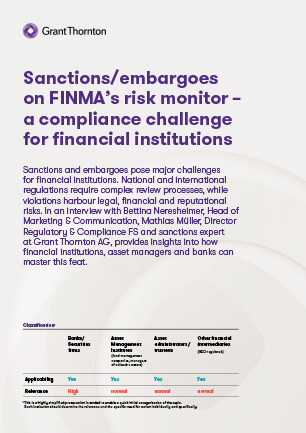-
Audit Industry, Services, Institutions
More security, more trust: Audit services for national and international business clients
-
Audit Financial Services
More security, more trust: Audit services for banks and other financial companies
-
Corporate Tax
National and international tax consulting and planning
-
Individual Tax
Individual Tax
-
Indirect Tax/VAT
Our services in the area of value-added tax
-
Transfer Pricing
Our transfer pricing services.
-
M&A Tax
Advice throughout the transaction and deal cycle
-
Tax Financial Services
Our tax services for financial service providers.
-
Advisory IT & Digitalisation
Generating security with IT.
-
Forensic Services
Nowadays, the investigation of criminal offences in companies increasingly involves digital data and entire IT systems.
-
Regulatory & Compliance Financial Services
Advisory services in financial market law and sustainable finance.
-
Mergers & Acquisitions / Transaction Services
Successfully handling transactions with good advice.
-
Legal Services
Experts in commercial law.
-
Trust Services
We are there for you.
-
Business Risk Services
Sustainable growth for your company.
-
IFRS Services
Die Rechnungslegung nach den International Financial Reporting Standards (IFRS) und die Finanzberichterstattung stehen ständig vor neuen Herausforderungen durch Gesetzgeber, Regulierungsbehörden und Gremien. Einige IFRS-Rechnungslegungsthemen sind so komplex, dass sie generell schwer zu handhaben sind.
-
Abacus
Grant Thornton Switzerland Liechtenstein has been an official sales partner of Abacus Business Software since 2020.
-
Accounting Services
We keep accounts for you.
-
Payroll Services
Leave your payroll accounting to us.
-
Real Estate Management
Leave the management of your real estate to us.
-
Apprentices
Career with an apprenticeship?!

Bettina Neresheimer: Sanctions and embargoes are currently a hot topic. FINMA recently included this in its risk monitor. Why is this topic such a big risk for financial institutions, Mathias?
Mathias Müller: Sanctions and embargoes have a significant impact on financial institutions. Breaches can result in high penalties, legal consequences and reputational damage. The geopolitical situation, in particular the war in Ukraine, has greatly increased the number and complexity of international sanctions. Financial institutions must comply with Swiss regulations as well as international regulations such as those of the EU and OFAC, whose extraterritorial reach creates additional challenges. Monitoring nested structures and indirect transactions is particularly difficult. Attempts at circumvention, for example through disguised trade routes or cryptocurrencies, require sophisticated compliance systems and qualified personnel. Longer sanction periods further increase the risk of circumvention strategies.
Bettina Neresheimer: What consequences do financial institutions face if they breach national or international sanctions?
Mathias Müller: The consequences can be serious. In addition to legal consequences such as fines and criminal proceedings, there is also the threat of regulatory measures, including the withdrawal of licence as a worst-case-scenario. While exorbitantly high fines have been imposed internationally for years, particularly in the USA, comparable penalties have rarely been imposed in Switzerland. However, FINMA has added sanctions to its risk monitor and has already carried out numerous on-site inspections, which may indicate stricter enforcement and more proceedings in the future. Reputational risks are also significant, as breaches can cause lasting damage to the trust of customers and investors. In extreme cases, there may be consequences that threaten the company›s existence, such as loss of access to international markets (especially the USA).
“Switzerland generally bases its sanctions on UN Security Council resolutions or adopts EU measures in order to avoid creating opportunities for circumvention.”
Bettina Neresheimer: How do the Swiss sanctions differ from the EU or US regulations, and what special challenges do they pose for financial institutions?
Mathias Müller: Switzerland generally bases its sanctions on UN Security Council resolutions or adopts EU measures in order to avoid creating opportunities for circumvention. Nevertheless, Switzerland often remains somewhat more cautious than other countries due to its foreign policy, which is characterised by neutrality. The US, on the other hand, take a more aggressive approach that has an extraterritorial effect – meaning that non-US institutions can also be affected if, for example, they process payments in US dollars or have business dealings with US persons. This makes the OFAC rules particularly relevant, as they apply a strict 50% rule: Companies that are at least 50% directly or indirectly controlled by sanctioned persons are also considered sanctioned. Financial institutions in Switzerland must therefore not only fulfil the national requirements, but also ensure that they comply with international regulations in order to mitigate business risks.
Bettina Neresheimer: The Russia sanctions are considered to be particularly extensive and dynamic. What makes them so complex?
Mathias Müller: The Russia sanctions are unique in their scale and complexity. They cover individuals, companies, entire economic sectors such as energy and finance, specific goods and services as well as trade in certain securities. In addition, there are measures such as price caps for oil or import and export bans for high-tech products.
For financial institutions, this means that they not only have to prevent transactions directly with sanctioned persons or companies, but also analyse complex trade flows and corporate structures in order to identify potential violations. The constant adjustments – such as new sanctions packages or changes to existing regulations – increase the pressure on compliance departments even further.
Bettina Neresheimer: How do sanctions affect the onboarding and ongoing monitoring of customers?
Mathias Müller: Sanctions checks are a central component of client onboarding. Financial institutions must check whether new clients, beneficial owners or other parties involved are on sanctions lists. This involves not only obvious hits, but also structures in which sanctioned persons may have indirect influence.
Ongoing monitoring is just as important, as sanctions are dynamic and lists change frequently. For example, if a customer is placed on a sanctions list during an existing business relationship, the institution must act quickly. A corresponding monitoring process and regular comparison with sanctions lists are therefore essential.
“Cryptocurrencies offer a high degree of anonymity and are therefore increasingly being used to circumvent sanctions.”
Bettina Neresheimer: What special (sanction) risks exist for asset managers when serving international clients, especially from high-risk regions?
Mathias Müller: On the one hand, the asset manager must ensure that client portfolios do not violate sanctions regulations. This applies in particular to avoiding investments in sanctioned securities, markets or companies. On the other hand, managing international clients from high-risk regions harbours further significant risks, particularly when identifying beneficial owners and managing complex asset structures. There is a risk of unknowingly managing the assets of sanctioned persons or indirectly breaching sanctions, for example by investing in prohibited securities. Clients from high-risk regions may also be politically exposed (PEP) or associated with money laundering-related activities. Comprehensive due diligence, robust compliance systems and continuous monitoring are essential to minimise these risks.
Bettina Neresheimer: How can financial institutions ensure that sanctions are not circumvented, for example through disguised structures or cryptocurrencies?
Mathias Müller: Circumventing sanctions is a major problem, especially in the case of nested corporate structures or through the use of virtual asset service providers (VASP), which enable transactions in cryptocurrencies. Cryptocurrencies offer a high degree of anonymity and are therefore increasingly being used to circumvent sanctions. Financial institutions must therefore strengthen their KYC processes in order to better identify beneficial owners. Suspicious patterns such as unusual transaction volumes, payments via high-risk countries or a lack of economic substance should be an alarm signal. Monitoring should also be extended to cryptocurrencies in order to recognize potential circumvention attempts at an early stage.
Bettina Neresheimer: Can you summarise Mathias, what financial institutions should consider with regard to the future of sanctions regulation?
Mathias Müller: Sanctions will continue to play a central role in international politics in the future and will become increasingly complex. Financial institutions should be prepared for the fact that regulatory requirements are evolving dynamically, particularly as a result of new technologies such as cryptocurrencies, which create additional risks. Efficient compliance systems, targeted training and a clear focus on high-risk customers with international connections are essential in order to recognize risks at an early stage and act effectively.


